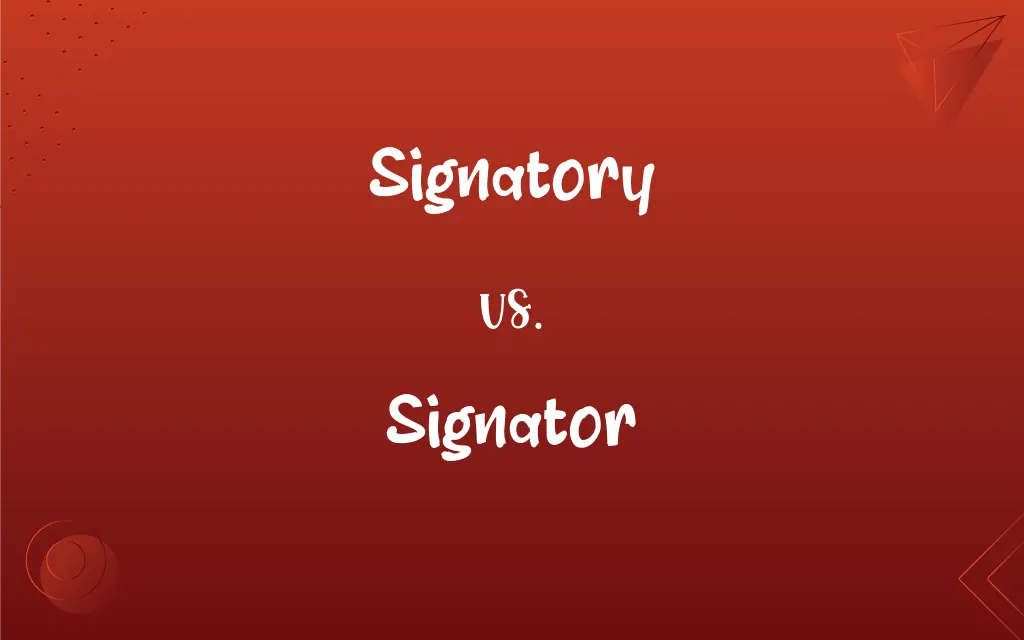Signatory vs. Signator: What's the Difference?
Edited by Harlon Moss || By Janet White || Updated on October 7, 2023
Signatory refers to a person who has signed an official document, while Signator is a less common variant with the same meaning.

Key Differences
Signatory and Signator, in essence, share a common ground as they both denote someone who signs a document. The term Signatory is widely recognized and accepted in legal, business, and everyday parlance. This term commonly appears in contexts like treaties, agreements, or contracts where formal acknowledgment is needed. For example, in international relations, countries that have agreed to a treaty's terms are often termed "signatories."
On the other hand, Signator, while conveying a similar idea, is less frequently used in modern English. Its origin and implications mirror that of Signatory, but its usage is far less prevalent. Though Signator might be found in older texts or specific niches, it's important to note that many people may be unfamiliar with it.
Both words have roots in Latin – the verb "signare," which means "to mark." This marking, in the context of both Signatory and Signator, pertains to the act of signing, symbolizing agreement, acknowledgment, or endorsement. Nevertheless, if one were drafting a formal document or communicating in a professional setting today, "Signatory" would likely be the preferred term due to its widespread recognition.
To encapsulate, both Signatory and Signator denote someone who signs a document, especially in a formal or official capacity. Yet, Signatory stands out as the more commonly recognized and utilized term in contemporary contexts.
Comparison Chart
Definition
Person who signs a document
Another term for a person who signs a document
ADVERTISEMENT
Usage Frequency
Commonly used
Less common
Preferred in Formal Texts
Yes
Less often
Etymology
Derived from Latin "signare"
Derived from Latin "signare"
Recognition
Widely recognized in modern English
Less recognized
Signatory and Signator Definitions
Signatory
An individual who has signed a document.
He was the primary signatory on the contract.
ADVERTISEMENT
Signator
One who signs a document.
As the primary signator, he held significant responsibility.
Signatory
A party that agrees to the terms of a treaty.
The country became a signatory to the international agreement.
Signator
An individual providing written consent.
The document required a signator to proceed.
Signatory
A person authorized to sign on behalf of another.
As his attorney, she acted as his signatory.
Signator
One who officially endorses through signing.
He was a notable signator of the historic declaration.
Signatory
One who endorses or supports a movement.
She was a signatory of the petition against deforestation.
Signator
A party appending their signature to an agreement.
The organization acted as a signator in the merger.
Signatory
Bound by signed agreement
The signatory parties to a contract.
Signator
A person acknowledging in written form.
Every signator was recorded for transparency.
Signatory
One who has signed a contract or other legal document as a party.
Signator
A signatory: someone who signs something.
Signatory
A country that is a party to a treaty.
Signatory
One who signs or has signed something.
Signatory
Relating to a seal; used in sealing.
Signatory
Signing; joining or sharing in a signature.
Signatory powers
Signatory
Relating to a seal; used in sealing.
Signatory
Signing; joining or sharing in a signature; as, signatory powers.
Signatory
A signer; one who signs or subscribes; as, a conference of signatories.
Signatory
Someone who signs and is bound by a document
Signatory
A person who gives written acknowledgment.
As a witness, she was a signatory on the official record.
FAQs
Is Signator an outdated term?
It's less common than Signatory but not necessarily outdated.
Do both words come from Latin?
Yes, both derive from the Latin verb "signare."
Is Signator recognized in legal documents?
While it may be understood, Signatory is the more recognized term in legal contexts.
Can a Signatory represent someone else?
Yes, a signatory can sign on behalf of another if authorized.
Is Signator found in modern dictionaries?
It might appear, but Signatory is more commonly listed and recognized.
How many signatories can a document have?
A document can have multiple signatories, depending on its requirements.
Is every signer of a document a Signator?
Technically, yes, but the term Signatory is more commonly used to describe such a person.
Can a country be a Signatory?
Yes, countries can be signatories to treaties or agreements.
Are Signatory and Signator synonymous?
Essentially, yes, but Signatory is more commonly used.
Can an organization be a Signatory?
Absolutely, organizations can be signatories to agreements or endorsements.
Are there specific contexts where Signator is preferred?
It's rare, but Signator might appear in older texts or specific niches.
What's the significance of being a treaty Signatory?
It means the party has agreed to the treaty's terms and conditions.
Is a Signator's role just to sign documents?
Primarily, but the act of signing symbolizes agreement, endorsement, or acknowledgment.
Does the word Signator appear in international law?
It's rare. The term "Signatory" is more commonly used in international law contexts.
Is there a significant difference in meaning between Signatory and Signator?
No, they convey the same primary idea, but Signatory is more universally recognized.
Is a Signatory always an individual?
No, entities like organizations or countries can also be signatories.
Does the role of a Signator vary across documents?
The basic role is to sign, but the implications vary based on the document's nature.
Does a Signatory always mean full agreement?
Generally, yes, but context matters. It signifies acknowledgment or endorsement.
Can a Signatory be held accountable?
Yes, a signatory can be held accountable based on what they've signed.
Is a Signatory's signature legally binding?
Generally, yes, especially in legal, contractual, or formal contexts.
About Author
Written by
Janet WhiteJanet White has been an esteemed writer and blogger for Difference Wiki. Holding a Master's degree in Science and Medical Journalism from the prestigious Boston University, she has consistently demonstrated her expertise and passion for her field. When she's not immersed in her work, Janet relishes her time exercising, delving into a good book, and cherishing moments with friends and family.
Edited by
Harlon MossHarlon is a seasoned quality moderator and accomplished content writer for Difference Wiki. An alumnus of the prestigious University of California, he earned his degree in Computer Science. Leveraging his academic background, Harlon brings a meticulous and informed perspective to his work, ensuring content accuracy and excellence.































































